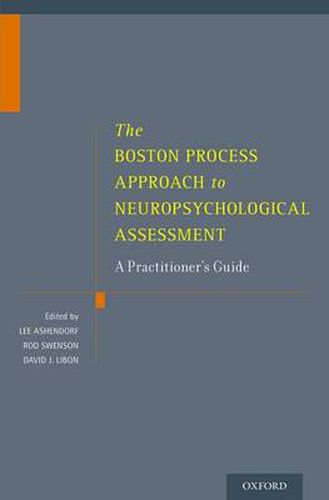Readings Newsletter
Become a Readings Member to make your shopping experience even easier.
Sign in or sign up for free!
You’re not far away from qualifying for FREE standard shipping within Australia
You’ve qualified for FREE standard shipping within Australia
The cart is loading…






The Boston Process Approach to neuropsychological assessment, advanced by Edith Kaplan, has a long and well-respected history in the field. However, its theoretical and empirical support has not previously been assembled in an easily accessible format. This volume fills that void by compiling the historical, empirical, and practical teachings of the Process Approach.
The reader will find a detailed history of the precursors to this model of thought, its development through its proponents such as Harold Goodglass, Nelson Butters, Laird Cermak, and Norman Geschwind, and its continuing legacy. The second section provides a guide to applying the Boston Process Approach to some of the field’s most commonly used measures, such as the various Wechsler Intelligence Scales, the Trail Making Test, the California Verbal Learning Test, and the Boston Naming Test. Here, the reader will find a detailed history of the empirical evidence for test administration and interpretation using Boston Process Approach tenets. The final section of the book provides various perspectives on the implementation of the Boston Process Approach in various clinical and research settings and with specialized populations.
$9.00 standard shipping within Australia
FREE standard shipping within Australia for orders over $100.00
Express & International shipping calculated at checkout
The Boston Process Approach to neuropsychological assessment, advanced by Edith Kaplan, has a long and well-respected history in the field. However, its theoretical and empirical support has not previously been assembled in an easily accessible format. This volume fills that void by compiling the historical, empirical, and practical teachings of the Process Approach.
The reader will find a detailed history of the precursors to this model of thought, its development through its proponents such as Harold Goodglass, Nelson Butters, Laird Cermak, and Norman Geschwind, and its continuing legacy. The second section provides a guide to applying the Boston Process Approach to some of the field’s most commonly used measures, such as the various Wechsler Intelligence Scales, the Trail Making Test, the California Verbal Learning Test, and the Boston Naming Test. Here, the reader will find a detailed history of the empirical evidence for test administration and interpretation using Boston Process Approach tenets. The final section of the book provides various perspectives on the implementation of the Boston Process Approach in various clinical and research settings and with specialized populations.